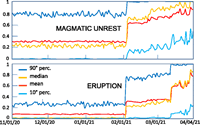Rational volcanic hazard forecasts and the use of volcanic alert levels
Papale P. (2017).
Journal of Applied Volcanology, 6/13, https://doi.org/10.1186/s13617-017-0064-7.
Abstract
Volcanologists make hazard forecasts in order to contribute to volcanic risk assessments and decision-making, in areas where volcanic phenomena have the potential to impact societal assets. Present-day forecasts related to the potential occurrence of an eruption mostly take the form of alert levels, that are established by volcano scientists with the aim of communicating the state of a volcano and its possible short-term evolution. Here I analyse current alert level systems and their role in decision-making processes. I show that the use of such systems implies predictive capabilities not supported by corresponding levels of confidence in the knowledge of the volcano. Their use also implies an assumption of volcano scientist responsibility for decisions that goes beyond the expertise of the scientist, and which, in most countries, is not granted by a corresponding societal mandate. A rational volcanic hazard forecast system accepts instead the uncertain nature of volcanic processes and the consequent limited predictive capabilities; forecasts expressed as probabilities, or better as probability distributions, reflect a rational attitude by scientists and assure clear roles that reflect both expertise and societal mandate to any group involved in the management of a volcanic crisis. Exceptions where the use of volcanic alert levels may lead to efficient management are also discussed.
https://appliedvolc.springeropen.com/articles/10.1186/s13617-017-0064-7


